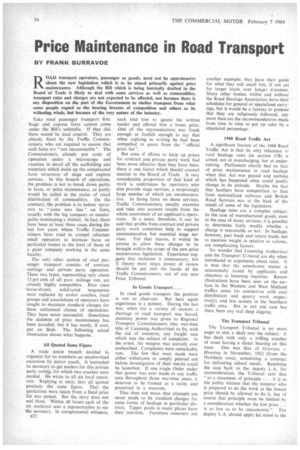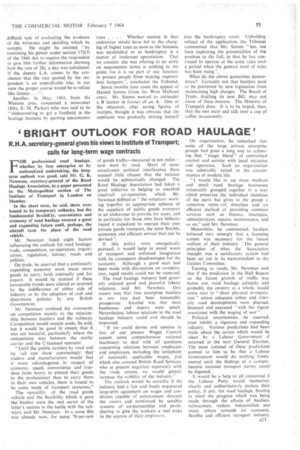Price Maintenance in Road Transport
Page 56

Page 57

If you've noticed an error in this article please click here to report it so we can fix it.
BY FRANK BURRAVOE ROAD transport operators, passenger or goods, need not be apprehensive about the new legislation which is to be aimed primarily against price maintenance. Although the Bill which is being hurriedly drafted in the Board of Trade is likely to deal with some services as well as commodities, transport rates and charges are not expected to be affected, not because there is any disposition on the part of the Government to shelter transport from what some people regard as the bracing breezes of competition and others as its withering winds, but because of the very nature of the industry.
Take road passenger transport first. Stage and express fares cannot come under the Bill's umbrella. If they did, there would be dual control. They are already fixed by the Traffic Commissioners, who are required to ensure that such fares are "not unreasonable". The Commissioners already put costs of operation under a microscope and examine in detail all the scaffolding and materials which build up the complicated fares structures of stage and express services. In this branch of operations, the problem is not to break down parity in fares, or price maintenance, as parity would be called in the realm of retail distribution of commodities. On the contrary, the problem is to induce lperators to "come into line" on fares, usually with the big company or municipality dominating a district. In fact, there have been at least three cases during the last few years where Traffic Commissioners have tried to compel reluctant small operators to increase fares on particular routes to the level of those of a giant company working in the same locality.
The only other section of road passenger transport consists of contract carriage and private party operation. These two types, repre.sentingonly about 13 per cent of all p.s.v. mileage run, are already highly competitive. Ever since horse-drawn, solid-tyred wagonettes were replaced by motor coaches, local groups and associations of operators have sought to maintain standard charges for these unlicensed classes of operations. They have never succeeded. Sometimes the skeleton of price maintenance has been paraded, but it has rarely, if ever, put on flesh. The following actual illustration shows what happens.
All Quoted Same Figure
A trade union branch decided to organize for its members an unadvertised excursion by motor coach. It instructed its secretary to get tenders for this private party outing, for which two coaches were needed. He wrote to all six focal operators. Replying at once, they all quoted precisely the same figure. That the quotations were taken from a fixed price list was patent. But the story does not end there. Within 48 hours each of the six tenderers sent a representative to see the secretary. In conspiratorial whispers,
n// each told him to ignore the written tender and offered him a lower price. One of the representatives was frank enough or foolish enough to say that when replying in writing he had been compelled to quote from the "official price list ".
But even if efforts to keep up prices for contract and private party work had been more effective than they have been, there is one factor which should counsel caution in the Board of Trade. A very considerable proportion of that kind of work is undertaken by operators who also provide stage services, a surprisingly large number of which are unremuneraLive. In fixing fares on those services, Traffic Commissioners usually examine and take into account results from the whole assortment of an applicant's operations. In a sense, therefore, it can he said that profits from contract and private party work sometimes help to support unremunerative but essential stage ser
vices. For that reason, it would be unwise to allow these charges to be brought within the scope of the new price maintenance legislation. Experience suggests that inclusion is unnecessary; but if theory must reign, power of review should be put into the hands of the Traffic Commissioners, not of any new Price Tribunal.
In Goods Transport.
In road goods transport the position is not so clear-cut. But here again experience is a pointer. During the last war, when for a variety of reasons a shortage of road transport was feared, statutory power was given to Regional Transport Commissioners (the war-time title of Licensing Authorities) to fix, with the aid of assessors, any freight rate which was the subject of complaint. In the event, the weapon was scarcely ever unsheathed. Complaints were remarkably rare. The few that were made were either withdrawn or simply petered out before investigation of their merits could be launched. If one single Order under that power was ever made in any traffic area throughout those war-time years, it deserves to be framed as a rarity and preserved in a museum.
That does not mean that attempts are never made to fix standard charges for some forms of haulage in particular districts. Tipper pools in many places have their rate-lists. Furniture removers are another example; they have their guide for what they call small lots, if not yet for larger loads over longer d:stances.. Many other bodies, within and without the Road Haulage Association, have their schedules for general or specialized carryings, but it would be a fantasy to pretend that they are religiously followed, any more than are the recommendations made from time to time to put up rates by a stipulated percentage.
1960 Road Traffic Act '
A significant feature of the 1960 Road Traffic Act is that its only reference :0 road haulage rates (in section 178) is aimed, not at overcharging, but at undercutting. Parliament clearly had no fear of price maintenance in road haulage when that Act was passed and nothing which has happened since could justify change in its attitude. Maybe the fact that hauliers have competition to face from nationalized railways and British Road Services was at the back of the minds of some of the legislators.
Haulage rates are a complex subject. In the case of manufactured goods, even in the case of many services, it is possible to determine fairly readily whether a charge is reasonable or not. In haulage, however, part loads and return loads, not to mention weight in relation to volume, are complicating factors.
No wonder that Licensing Authorities and the Transport Tribunal are shy when introduced to arguments about rates. It is true that the unwelcome matter is occasionally raised by applicants and objectors at licensing inquiries. Recent illustrations have been seen on the surface in the Western and West Midland traffics areas (in connection with coal distribution and quarry work respectively), and less acutely in the Northern traffic area. But in not one case has there been any real deep digging.
The Transport Tribunal
The Transport Tribunal is no more eager to sink a shaft into the subject. It has dealt with only a trifling number of cases having a direct bearing on this issue. One was that of Grierson v. Henning in November, 1962 (from the Northern area), concerning a contract for delivering school meals. Remitting the case back to the deputy L.A. for reconsideration, the Tribunal said that "as a statement of principle . . . it is in the public interest that the tenderer who is prepared to do the work at the lowest price should be allowed to do it, but of course that principle must be limited by a consideration whether the low price ... is so low as to be uneconomic". The deputy L.A. should apply his mind to the difficult task of evaluating the evidence of the witnesses and deciding which he accepts. He might be assisted "by exercising his power under section. 172(3) of the 1960 Act to require the respondent to give him further information showing how the rate of 28s. a day was calculated. If the deputy L.A. comes to the conclusion that the rate quoted by the respondent is an unprofitable one, in our view the proper course would be to refuse this licence . . . ".
Another, in May, 1963, from the Western area, concerned a newcomer (Mrs. E. M. Parker) who was said to be "endeavouring to get a foothold in the haulage business by quoting uneconomic rates . . . Whether success in that endeavour would have led to the charging of higher rates as soon as the business was established or to bankruptcy is a matter of irrelevant speculation. That we consider she was offering to do work on unecomonic terms is nothing to the point, for it is no part of our function to protect people from making improvident bargains ", concluded the Tribunal.
Seven months later came the appeal of Harold Simms (from the West Midland area). Mr. Simms wanted to surrender a B licence in favour of an A. One of the objectors, after seeing figures of receipts, thought it was obvious that the applicant was gradually driving himself into the bankruptcy court. Upholding refusal of the application, the Tribunal commented that Mr: Simms "has not been exploiting the potentialities of the position to the full, in that he has continued to operate at the same rates over a period when the general level of rates has been rising ".
What do the above quotations demonstrate? Certainly not that hauliers need to be prevented by new legislation from maintaining high charges. The Board of Trade, drafting its new Bill, may not know of these matters. The Ministry of Transport does. It is to be hoped, then, that the two meet and talk over a cup of coffee occasionally.




















































































































